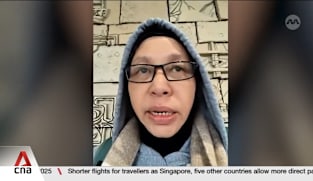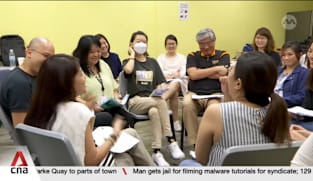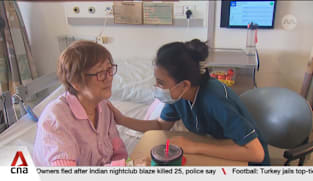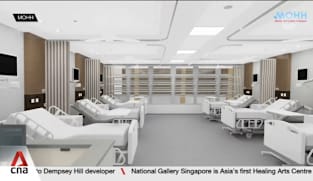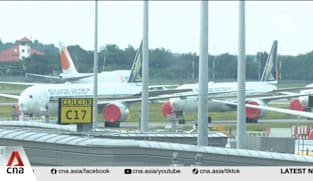Tan See Leng on Singapore’s COVID-19 response
The past three years of the COVID-19 pandemic have been a “long and arduous journey”, fraught with many uncertainties and challenges, said Manpower Minister Tan See Leng. Speaking in Parliament on Monday (Mar 20), he said right from the start, Singapore had one overriding objective and that is to protect lives. Singapore was also determined to emerge with a strong and resilient economy and to protect jobs and livelihoods. Dr Tan said despite the scale of the outbreak in the dormitories, the Government made a concerted effort to safeguard migrant workers. He said the Government will use the lessons from the COVID-19 pandemic to build resilience in the dormitories. He highlighted three areas of reforms. These are housing resilience in the form of new dormitories standards, healthcare resilience in the form of a new primary healthcare system and social support resilience. On housing resilience, Dr Tan said the Government is working closely with stakeholders to develop a plan for existing dormitories to transition to the new improved standards. The details of the transition plan will be announced later in the year. The Government will continue to strengthen its regulatory levers on dormitory operators. The Foreign Employee Dormitories Act will be expanded to include migrant worker dormitories with seven or more beds starting from April. This will also offer additional levers to enforce against the dormitory operators. Other than financial penalties, operators could also be directed to rectify lapses. To grow capabilities in dormitory management, MOM will be building two new dormitories which will be operated by a new corporate entity, in partnership with the private sector. They will also provide MOM with the opportunity to innovate and pilot new ideas for public health resilience and dormitory living. Dr Tan said these will transform the entire migrant worker landscape. In addition to housing resilience, Singapore will also need to strengthen healthcare resilience in the migrant worker community and redesign the way primary care services are delivered to migrant workers. Dr Tan said the healthcare resilience of the migrant worker community is now significantly strengthened. MOM will always prioritise the safety of migrant workers and ensure that they could continue working, receiving their salary and sending money home, said Dr Tan. He said Singapore will “remember these lessons” as it builds a stronger migrant worker ecosystem and ensure that the migrant workforce remains productive and pandemic-resilient, complementing the local workforce. Turning to jobs and livelihoods of Singaporeans, Dr Tan said COVID-19 has demonstrated the need to continue to build on tripartite trust and partnerships as a key competitive advantage for Singapore. “While we are yet to reach journey’s end, we have indeed come through the storm together,” he said.
The past three years of the COVID-19 pandemic have been a “long and arduous journey”, fraught with many uncertainties and challenges, said Manpower Minister Tan See Leng. Speaking in Parliament on Monday (Mar 20), he said right from the start, Singapore had one overriding objective and that is to protect lives. Singapore was also determined to emerge with a strong and resilient economy and to protect jobs and livelihoods. Dr Tan said despite the scale of the outbreak in the dormitories, the Government made a concerted effort to safeguard migrant workers. He said the Government will use the lessons from the COVID-19 pandemic to build resilience in the dormitories. He highlighted three areas of reforms. These are housing resilience in the form of new dormitories standards, healthcare resilience in the form of a new primary healthcare system and social support resilience. On housing resilience, Dr Tan said the Government is working closely with stakeholders to develop a plan for existing dormitories to transition to the new improved standards. The details of the transition plan will be announced later in the year. The Government will continue to strengthen its regulatory levers on dormitory operators. The Foreign Employee Dormitories Act will be expanded to include migrant worker dormitories with seven or more beds starting from April. This will also offer additional levers to enforce against the dormitory operators. Other than financial penalties, operators could also be directed to rectify lapses. To grow capabilities in dormitory management, MOM will be building two new dormitories which will be operated by a new corporate entity, in partnership with the private sector. They will also provide MOM with the opportunity to innovate and pilot new ideas for public health resilience and dormitory living. Dr Tan said these will transform the entire migrant worker landscape. In addition to housing resilience, Singapore will also need to strengthen healthcare resilience in the migrant worker community and redesign the way primary care services are delivered to migrant workers. Dr Tan said the healthcare resilience of the migrant worker community is now significantly strengthened. MOM will always prioritise the safety of migrant workers and ensure that they could continue working, receiving their salary and sending money home, said Dr Tan. He said Singapore will “remember these lessons” as it builds a stronger migrant worker ecosystem and ensure that the migrant workforce remains productive and pandemic-resilient, complementing the local workforce. Turning to jobs and livelihoods of Singaporeans, Dr Tan said COVID-19 has demonstrated the need to continue to build on tripartite trust and partnerships as a key competitive advantage for Singapore. “While we are yet to reach journey’s end, we have indeed come through the storm together,” he said.











